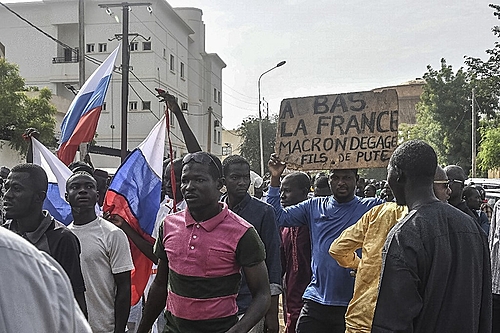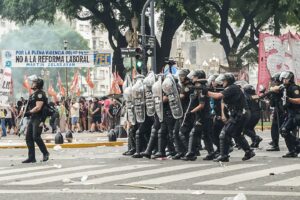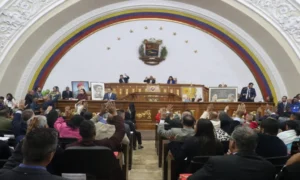
Shortly after the coup d’état in Niger, demonstrators in favor of the coup military were seen burning French flags and chanting “Russia, Russia” or “Viva Putin” in front of the French embassy in Niamey.
The images drew attention to a development that has not received the attention it deserves in the Western press: Russia’s growing presence and influence in several African countries.
In recent years, some African countries have renounced cooperation with France, whom they accuse of interfering in internal affairs, in favor of Russia, which supplies them with arms or even grain.
Niger, if the coup leaders prevail, would be just the most recent example, after Mali and Burkina Faso, of a country in the Sahel region that underwent a coup d’état after 2020 and then turned to Russia.
The Sahel is an extensive strip of territory that horizontally crosses the African continent, from end to end, and passes through countries such as Burkina Faso, Chad, Mauritania, Mali, Niger and Nigeria, being one of the poorest regions of the continent, ravaged by conflicts and with a large presence of terrorist groups.
anti-French sentiments
Niger was a French colony from the beginning of the 20th century until 1960, when it became an independent country. Today it is one of the main suppliers of uranium to French nuclear power plants, with about a third of the total in a country where 70% of electricity is generated by atomic reactors.
For many Africans, the colonial past weighs heavily against France. Added to this, in the post-colonial period, is the frequent support of the Élysée to African autocrats.
Furthermore, many people in Africa perceive President Emmanuel Macron as arrogant, which certainly does not improve France’s image.
Activist fights for the return of art looted from Africa
Despite the perceived arrogance that accompanies it, it must be said that few French leaders have undertaken as much effort to improve France’s image in Africa as Macron.
In an unusual gesture for French leaders, he traveled to Rwanda to acknowledge that France bore major responsibility for the 1994 genocide, which left an estimated 800,000 dead.
Macron has ramped up financial aid to the continent, begun returning art looted during colonial times and provided military support to combat jihadist militants who have killed countless civilians in Africa.
Combating terrorism
Since 2013, nearly 5,000 French troops have been deployed to fight jihadist groups in Mali, Burkina Faso, Chad, Niger and Mauritania.
In August 2022, more than nine years after being received in Mali as “saviors”, the 2,400 French troops completed their withdrawal from the country, ordered by Macron due to deteriorating relations with the ruling military junta in Bamako and in the face of growing hostility of local public opinion towards France.
Two months later, it was the turn of the approximately 400 French soldiers in Burkina Faso to leave the country.
Of the initial contingent, France maintains 2,500 soldiers in the region, divided between Chad and Niger, to combat armed terrorist groups in the Sahel.
The departure of French soldiers is usually followed by a rapprochement with the Wagner Group, as in the case of Mali, where the military junta in power in Bamako made an agreement with the mercenaries to support its army.
Operation on social networks
Russia knows how to make use of anti-French sentiments in Africa. A recent investigation by the British company Logically showed that widespread disinformation activity on social media has helped to promote anti-Western and pro-Russian positions on the continent.
Typical posts accuse France of neo-colonialism, praise President Vladimir Putin and the Wagner Group mercenaries, and promote the well-known disinformation about the government of Ukraine, called “Nazi”.
The network, which operates on Facebook, YouTube and Telegram and is called Russosphère, is linked to a Belgian far-right political activist, Luc Michel, according to researchers at Logicallya start-up specializing in analyzing and combating misinformation.
Russosphère, which defines itself as “a network in defense of Russia”, gained strength in early 2022, shortly after Russia’s invasion of Ukraine.
“Most of Michel’s operations in Africa promote Pan-Africanism and anti-colonialist sentiments as a rallying point to support Michel’s central thesis: that African countries would gain if they distanced themselves from their European colonizers and developed strong relationships with Russia,” write researchers from the Logically.
The argument is successful in several African countries because it is based on real and widespread feelings among the population.
“I think it’s absolutely reasonable to assume that most people [no Níger] are pro-Russian at the moment,” commented Sahelian expert Abiol Lual Deng in an interview with DW.
She further notes that Putin upholds conservative social values that have wide appeal among many Africans.
Dome in Saint Petersburg
In addition to the burning of French flags and pro-Russian chants, the result of Russia’s efforts for greater influence could also be seen at the recent Russia-Africa Summit 2023, held in St. Petersburg.
There, Burkina Faso’s coup leader and proclaimed “transitional president”, Ibrahim Traoré, described Russia as a “family” due to “the shared history in the fight against Nazism” and in view of the remnants of colonialism that still remain on the continent.
Burkina Faso, ruled by a military junta since the January 2022 coup against then-president Roch Marc Christian Kaboré, has seen growing insecurity since 2015.
The military junta now headed by Traoré staged a mutiny in September, in effect a palace coup against the former leader, Paul-Henri Sandaogo Damiba.
Mali’s interim president, Colonel Assimi Goita, thanked Putin for his military assistance.
“Mali has a military alliance with Russia. We appreciate your support and friendship. Thanks to Russia, we were able to strengthen our Armed Forces and our security services,” Goita declared during his speech at the summit.
Goita noted that Russia has shown itself to be “a reliable partner” that has always “respected Mali’s sovereignty”.
He stressed that Mali is now an “absolutely independent and self-sufficient” country, whose army can defend its “territorial integrity”.
Civilian deaths have increased by 278% since the Wagner Group mercenaries arrived in Mali in December 2021, US Secretary of State Antony Blinken recently claimed.
Mali has been experiencing a deep political and security crisis since 2012, when rebel and jihadist groups took control of the north of the country, which has deteriorated after the two coups d’état that took place in August 2020 and May 2021.
At the summit in St. Petersburg, Putin announced that his country had signed arms contracts with more than 40 African nations. He pointed out that part of the supply of weapons to these countries is done free of charge, since the ultimate objective is “to guarantee their security and sovereignty”.
Source: www.brasildefato.com.br

